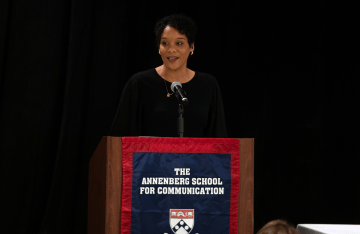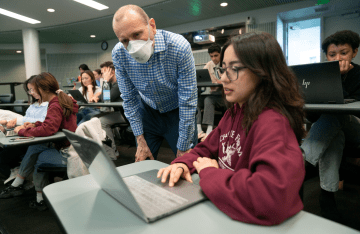Communication Majors Complete 2021 Senior Honors Theses
From cancel culture to hunger to political polarization, their subjects span the field of Communication.

Photo Credit: Eli Francis / Unsplash
Ten Communication majors completed senior honors theses this year. All will graduate with honors at Annenberg’s Communication Major Graduation Ceremony next month.
Typically, students present their thesis projects in person to a group of faculty, staff, and fellow students; however, due to the continued coronavirus pandemic and the digital format of the spring 2021 semester, students will present their projects virtually. Two students, Jaden Baum and Jean Chapiro, also presented their work as part of Penn’s Center for Undergraduate Research & Fellowships’ virtual Spring Poster Session.
The Communication thesis course lasts two semesters and is taught by Kim Woolf, Ph.D. For the first semester, the students write research proposals that contain a literature review and detailed methodologies for their theses. During the second semester, the students complete data collection and write the thesis.
From cancel culture to hunger to political polarization, their subjects span the field of Communication:
Jaden D. Baum

“Live from the Web, It’s Whenever You Want: Exploring the Relationship between User-Generated Content and Comedy Gatekeepers”
Thesis Advisor: Michael X. Delli Carpini
This study examines the impact that the rising popularity of user-generated comedy content (UGC) has had on the existing structure of the comedy industry. Through interviews with aspiring and practicing comedians, the study finds that validation from the existing industry is important to comedians, though digital content is increasingly important and holds a significant amount of weight in the comedy industry.
Anna Farrell Callahan
“Infections, Elections, and Insurrections: The Evolution of Social Media Disinformation Policy in 2020”
Thesis Advisor: Carolyn Marvin
This thesis analyzes changes made to policies moderating political disinformation on
Facebook, Twitter, and YouTube in the leadup and aftermath of the 2020 U.S. presidential election. Through textual analysis of press releases, news coverage, and secondary research, as well as in-depth interviews with platform employees and eminent scholars i,t examines the motivation, effectiveness, and public reception of changes made between May 2020 and January 2021 and their implications for the future of internet speech and Section 230 of the Communications Decency Act.
Jean Chapiro
“Hambre: Hungry for Life”
Thesis Advisor: John L. Jackson, Jr.
This documentary explores the journey to overcome anorexia by coming to terms with all that being hungry for life implies. Through the collective voices of a triathlete, chef, and yogi, hunger becomes a medium of empowerment that defies the often portrayed “ideal” found in magazines, film, and television of what women should look like, who they should be, and what they should strive for. As a result, “Hambre: Hungry for Life” offers a lens of acceptance and analysis through which viewers will come to understand that certain forms of hunger are natural, powerful, and extend far beyond craving food.
Sia-Linda Mabeh Lebbie
“Building Blackness: A Textual Analysis of Sub-Saharan Femininity in Netflix African Original Films”
Thesis Advisor: Murali Balaji
The focus of this study is to analyze how Netflix-branded original films are depicting sub-Saharan African women. Given Netflix’s extensive and international reach, it is integral to study the portrayals of Black African women present on its platform. This study is a thematic textual analysis of four Netflix-branded original films starring female protagonists: Oloture, Lionheart, Citation, and Seriously Single. Each film was analyzed for five thematic areas: beauty, agency, social relationships, socioeconomic class, and proximity to Western culture.
Austin Maguire

“#CancelCulture: The Psychological Impacts of Online Public Shaming and the Line between Accountability and Cyberbullying”
Thesis Advisor: Julia Ticona
The purpose of this study is to understand the psychological impacts of cancel culture — online public shaming — on targeted individuals, learn how they cope with such large amounts of hate, and examine the line between holding an individual accountable and cyberbullying/harassment. These questions are explored through interviews with social media creators that have been “canceled,” as well as a textual analysis of posts from these online cancelations.
Caitlin E. McNamara

“Evaluating Instagram Influencers: Interactivity, Opinion Leader Status, and Health Attitudes among Black Americans”
Thesis Advisor: Joseph N. Cappella
In this study, researchers evaluated the relationship between the interactivity and opinion leader status of an Instagram influencer on changes in health attitudes among Black Americans through participant surveys that were given after participants viewed influencer profiles. The study did not find a significant relationship between interactivity, opinion leader status, and attitude, or perceived influencer effectiveness. It did find a relationship between openness, perceived interactivity, and the outcome variables.
Erin Elizabeth Quinn

“Memeing Politics: Evaluating Visual vs. Narrative Mode on Attitudes towards Political Issues”
Thesis Advisor: Ken Winneg
This study expands upon previous research to determine whether political memes have a greater impact on people’s attitudes towards political issues than narrative text. To answer this question, a controlled experiment was conducted with 423 participants who were exposed to one of four conditions: a political meme, a political narrative, a visual control, or a narrative control. Overall, there were no statistically significant differences among the four exposures.
Natalia Christine Rommen

“Crafting the Campaign: How Local and Regional Political Culture Influence Campaign Messaging”
Thesis Advisor: Yphtach Lelkes
The purpose of this research is to evaluate how campaign messaging strategy is formed, and whether or not campaigns use voter geography to inform and disseminate their messaging, on a regional, state, or even local level. This paper includes two studies. Study 1 is a content analysis of 180 advertisements from Donald Trump and Joe Biden’s campaigns in the 2020 election cycle. Study 2 included interviews from two political campaign strategists and discussed the influence of political culture on campaign messaging within states.
Chase Philip Serota
“Polarization and the Presidency: Ideological Rhetoric in Republican Presidential Speech over Four Decades”
Thesis Advisor: David Eisenhower
This thesis explores ideological rhetoric in presidential speech and the mechanisms by which this rhetoric is polarizing. The aim of this thesis is to better understand the phenomenon of polarization as it relates to the presidency and the mechanisms by which it exists in Republican Presidential speech through rhetorical analysis, to identify the extent to which the roots of Conservatism could be traced throughout the rhetoric of presidents across the four decades of the Reagan era, and to identify the characteristics of Conservative speech that are polarizing.
Ayaka Shimada

“From Subversive to the Mainstream: Kabuki, Queerness, and National Identity in Contemporary Japan”
Thesis Advisor: Jessa Lingel
Kabuki theatre, traditional Japanese theatre, is often regarded as “queered theatre” for its associations with homosexual practices prior to the 19th century, its performances featuring scandalous content, and its requirement for all roles, including female roles, to be played by men. However, in recent years, Kabuki has trickled into hegemonic, mainstream culture and has become disassociated with its queer roots. This study aims to untangle how Kabuki is positioned in contemporary Japanese society, with a focus on gender and sexuality.



